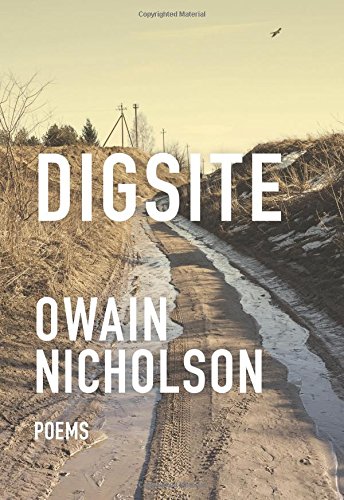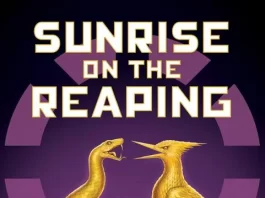With the opening line, “Aspen are pale femurs thrust skyward,” working archaeologist Owain Nicholson welcomes readers into such excavations of fractal similarities. The first poem, “Diggin’ in the Rain,” is a gripping beginning that hints at what humour, beauty, and casualties are to be uncovered in Digsite.
The poems convey some narrative throughout, but mostly they are keen observations dressed in metaphor or rhetorical play. Nicholson describes some potentially miserable conditions while working in the field such as being covered in muskeg and swarmed by horseflies while hard at work in the Alberta oil sands. No pleas for sympathy, just pure expressive observation of gratitudes and grievances. He sways from contemplating the beauty of dragonflies coupling in the rainfall, to lugging his steel-toes through Ecclesiastes’ less than encouraging notions. Titles like “Sisyphus Takes Atlas on a Hike” declare Nicholson’s existential preoccupations while he and fellow workers dig and sweat on.
In “Omens,” the gloomy line, “bipedality preceded encephalization” suggests that the work Nicholson is engaged in seems to have no intelligent goal; it just keeps going. Legs must have evolved before brains. He alludes to further auditing the significance of life later in the same poem: “Sometimes I think, there is meaning in people. All night, thunder, the clash of two rocks underwater. I am often wrong.” Trivial patterns can be meaningful for this archaeological poet, and intentional actions seen as absurd.
In Nicholson’s collection, the archaic is salvaged from everyday language in a way that surprises you with your own vocabulary. He mines the etymology of more familiar words to use them unusually, letting the word “photograph” become something that an ocean wave can do. This is poetry which requires the kind of mid-poem clause within “Let Us Dismember ‘Cultural Superiority’”: “May my words never be eroded by another’s citation; it is there that this language will sinister.” Trying to explain his poems would too often disfigure them. With sharp imagery Nicholson follows through on metaphors that sometimes become clear only after multiple stanzas are read. At the same time, he forbids any over-indulgent public analysis. There are poems in Digsite that inspire me to sit quietly for a time before reading another. In others, I will surely see new meaning jump out of during future readings.
Often a poem points out the worldly presence of metaphor rather than using it for another end, as in “Natural Selection” where in the city, “sunlit stalagmites scrape sky,” so that man-made buildings are embellished deposits of sediment dripping from a cave ceiling. Different processes are illustrated as having similar patterns, or as being part of one larger process. Also in “Natural Selection,” the paddling arms of a surfer are “cilia,” as in the the microscopic flailing limbs of a single-celled protozoa. Nicholson, labouring over the hot muskeg, glimpses the invisible threads of the great chain of being, the helix, and brings us these poems.
This is neither an optimist’s handbook nor a bohemian’s weeping for a natural world ravished by a senseless human species. In a strange way it seems to embrace the idea that “Every living is a kind of sacrifice, and each burial a monument for the beaks of scavengers.” Somehow it does not come across as hopeless raving that “it’s all a migration, all a hopelessness we share.” Deep time comes to light in “Hypocrisy Beneath the Sun” with the line “How they walked, those earlier people, we walk” and then future generations are envisioned looking back at us as their ancestors to “laugh / at our short, pitiful extirpation.” Nicholson sees evolutionary success as both the lottery jackpot, and the catastrophe.
While the drudgery of impersonal toil can outwardly seem to be meaningless, in Digsite Owain Nicholson effectively shows us that there are endless meaningful visions to be extracted from its practice.




